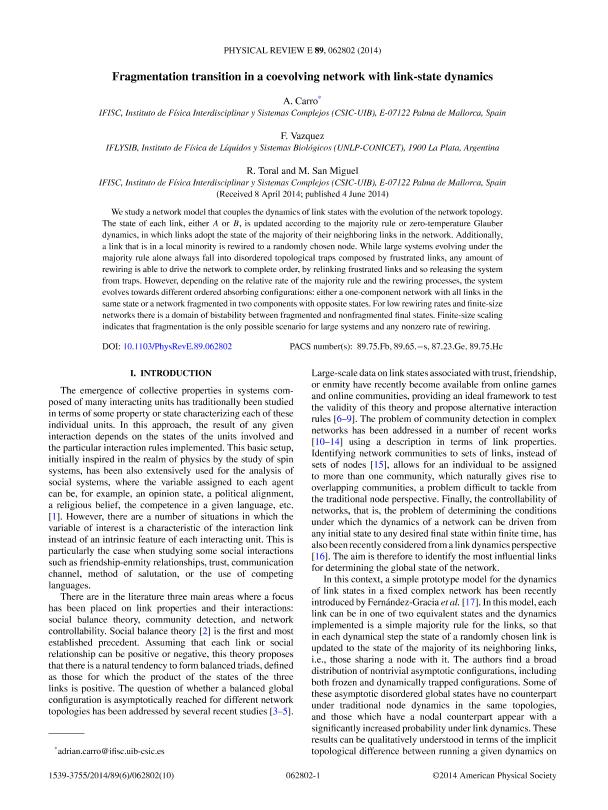Mostrar el registro sencillo del ítem
dc.contributor.author
Carro, A.
dc.contributor.author
Vazquez, Federico

dc.contributor.author
Toral, R.
dc.contributor.author
San Miguel, M.
dc.date.available
2018-01-04T18:48:37Z
dc.date.issued
2014-04
dc.identifier.citation
San Miguel, M.; Toral, R.; Vazquez, Federico; Carro, A.; Fragmentation transition in a coevolving network with link-state dynamics; American Physical Society; Physical Review E: Statistical, Nonlinear and Soft Matter Physics; 89; 6; 4-2014; 1-10
dc.identifier.issn
1539-3755
dc.identifier.uri
http://hdl.handle.net/11336/32345
dc.description.abstract
We study a network model that couples the dynamics of link states with the evolution of the network topology. The state of each link, either A or B, is updated according to the majority rule or zero-temperature Glauber dynamics, in which links adopt the state of the majority of their neighboring links in the network. Additionally, a link that is in a local minority is rewired to a randomly chosen node. While large systems evolving under the majority rule alone always fall into disordered topological traps composed by frustrated links, any amount of rewiring is able to drive the network to complete order, by relinking frustrated links and so releasing the system from traps. However, depending on the relative rate of the majority rule and the rewiring processes, the system evolves towards different ordered absorbing configurations: either a one-component network with all links in the same state or a network fragmented in two components with opposite states. For low rewiring rates and finite-size networks there is a domain of bistability between fragmented and nonfragmented final states. Finite-size scaling indicates that fragmentation is the only possible scenario for large systems and any nonzero rate of rewiring.
dc.format
application/pdf
dc.language.iso
eng
dc.publisher
American Physical Society

dc.rights
info:eu-repo/semantics/openAccess
dc.rights.uri
https://creativecommons.org/licenses/by-nc-sa/2.5/ar/
dc.subject
Link States
dc.subject
Galuber Dynamics
dc.subject
Topological Traps
dc.subject
Fragmentation
dc.subject.classification
Astronomía

dc.subject.classification
Ciencias Físicas

dc.subject.classification
CIENCIAS NATURALES Y EXACTAS

dc.title
Fragmentation transition in a coevolving network with link-state dynamics
dc.type
info:eu-repo/semantics/article
dc.type
info:ar-repo/semantics/artículo
dc.type
info:eu-repo/semantics/publishedVersion
dc.date.updated
2018-01-03T19:04:17Z
dc.journal.volume
89
dc.journal.number
6
dc.journal.pagination
1-10
dc.journal.pais
Estados Unidos

dc.journal.ciudad
New York
dc.description.fil
Fil: Carro, A.. Universidad de las Islas Baleares; España
dc.description.fil
Fil: Vazquez, Federico. Consejo Nacional de Investigaciones Científicas y Técnicas. Centro Científico Tecnológico Conicet - La Plata. Instituto de Física de Líquidos y Sistemas Biológicos. Universidad Nacional de La Plata. Facultad de Ciencias Exactas. Instituto de Física de Líquidos y Sistemas Biológicos; Argentina
dc.description.fil
Fil: Toral, R.. Universidad de las Islas Baleares; España
dc.description.fil
Fil: San Miguel, M.. Universidad de las Islas Baleares; España
dc.journal.title
Physical Review E: Statistical, Nonlinear and Soft Matter Physics

dc.relation.alternativeid
info:eu-repo/semantics/altIdentifier/doi/http://dx.doi.org/10.1103/PhysRevE.89.062802
dc.relation.alternativeid
info:eu-repo/semantics/altIdentifier/url/https://journals.aps.org/pre/abstract/10.1103/PhysRevE.89.062802
Archivos asociados
